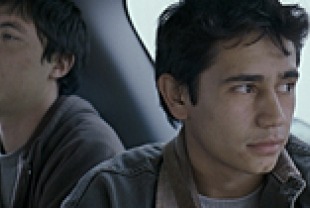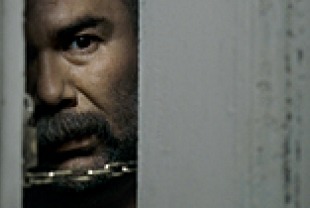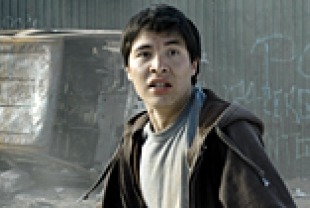In a small Mexican border town, Juan (Armando Hernandez) is running through the streets of a slum with men in hot pursuit of him. He ducks into a building and joins a band of undocumented immigrants. Soon he is traveling by truck with them to New York City. A born hustler, he learns from Pedro (Jorge Adrian Espindola) that he is going to connect with his wealthy father, Diego (Jesus Ochoa), who owns a restaurant. Pedro's never met him but he has a letter of introduction from his mother and a street address. When the truck reaches its destination, this dreamer finds that his bags and personal belongings, including the letter of introduction, are gone. He ends up on the street.
Juan has big dreams of his own of making it in America. He goes to meet Diego, masquerading as his son. But it's soon clear that he is not a rich entrepreneur given the dump he lives in. Diego is a dishwasher in a restaurant who supplements his meager income by sewing flowers and selling them to a local merchant. After splitting up with Pedro's mother, Diego has sent her $15,000 each year. Now he sequesters his money in a hidden place in his shabby room where he drinks alone every night. At the restaurant, he is ridiculed for his stinginess and work ethic. Diego has a hard time believing that Juan is telling him the truth; the boy is actually only interested in getting his money.
Meanwhile, Pedro tries desperately to make connection with his father. He sleeps on the street and, with no English, must rely upon Magna (Paola Mendoza), a drug addict who supports her habit with prostitution. Pedro faces one roadblock after another in his quest to reunite with his father.
Sangre De Mi Sangre (Blood of My Blood) is a Mexican film written and directed by Christopher Zalla. He has said of the film:
"Immigration is a global reality that has been a constant throughout human history. In fact, the whole United States is nothing more than a nation of immigrants, really, which is why I find it so ironic that the government is trying so hard to criminalize it. And yet, really what are people doing coming here but looking for a better life and trying to feed their families? New York City is such an amazing place not only because it is a city of immigrants, but because it is a place where all of these outsiders come together. It is a living example of how deeply fundamental our desire for community really is. We have put up all of these boundaries, these borders between each other, but ironically we're all looking for some sense of connection, of family. On its deepest level, that's what I think Sangre De Mi Sangre is about: the search for family."
Juan's only memory of his own father is a knife he gave him and the scar it made on his chest. For all of his deceptions and predatory instincts, even he melts for a moment when Diego cradles him in his arms while showing him how to sew properly. There is a similar moment for Pedro when he rubs Magna's back with a washcloth and recalls how soothing it was when his mother washed him as a child. And Diego has a magic moment of fatherly pride when he realizes that Juan is at ease with his co-workers while telling a funny story in front of them in a club.
The search for family is a universal yearning which is presented in this gritty drama with poignancy. But in the end, for these men New York is a harsh and unyielding place where being on the bottom is both a nightmare and a humiliation.


